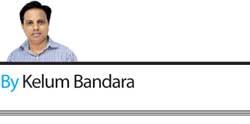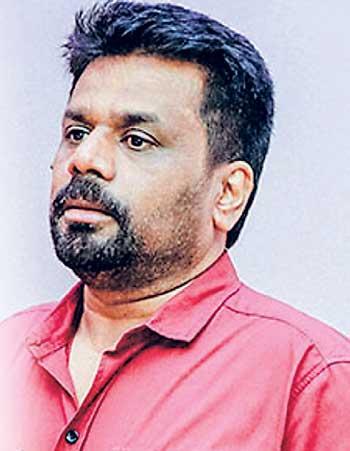The NPP changes system or vice versa
Posted on May 30th, 2025
Courtesy The Daily Mirror
- The NPP which claimed to be having solutions to all ills took charge. It has now found that delivery is not that easy.
 Public opinion is all powerful in any country. There is no escape for any government from it in furtherance of its policy implementations and decision making.
Public opinion is all powerful in any country. There is no escape for any government from it in furtherance of its policy implementations and decision making.
The current government is an extremely novel political phenomenon in Sri Lanka. It is a rejection of the old political forces that ruled the country one after another during the past 76 years of post-independence era.
It is an achievement for the ruling National People’s Power (NPP). People pinned high hopes on the party which is on a winning streak, blowing a death-knell to the traditional parties.  They have valid reasons for the choice of the NPP as the ruling party. On the one hand, the two main traditional political forces failed to live up to governing the country in the way they expected.
They have valid reasons for the choice of the NPP as the ruling party. On the one hand, the two main traditional political forces failed to live up to governing the country in the way they expected.
The dire state of the economy left them handicapped in the improvement of their quality of life. On the other hand, they expect a change in the political culture in which corruption, frauds, nepotism and cronyism overshadow the growth trajectory.
At government institutions, at times, people had to oil the hands of officials to get things done. Favouration was rampant in school admissions.
People who are moneyed and well –connected enjoyed the opportunities to navigate intricate rules and regulations their way. In securing jobs in the State sector, political patronage played a role. It was even seen as a norm, rather than violation or deviation.
In scaling up the ladder in politics, nepotism involved elbowing out those from outside family dynasties which called the shots from time to time. The 2022 economic crisis, the worst since Independence, turned out to be the boiling point of public wrath against the system that existed till then.
The NPP which claimed to be having solutions to all ills took charge. It has now found that delivery is not that easy.
There appears to be a wide chasm between pledges and delivery. One thing is proven- the mere change of government does not suffice as long as bureaucracy and system do not fall in line.
System change cannot happen overnight. Quick action on policy steps needs proper involvement of political authorities and bureaucratic drive.
During President Anura Kumara Dissanayake’s visit to Beijing, a US $ 3.7 billion investment was secured from Sinopec. But the project implementation is still in limbo. Progress on follow-up action is minimal. Institutional lethargy might have gotten in the way.
After the new government took office, it began to experience the lethargy that comes with governance. Unlike campaigning, governance is an area filled with competing interests, bureaucratic resistance, legal constraints, and institutional lethargy.
A party that pledged radical reform now confronts the entrenched habits of a state apparatus conditioned by decades of politicization and inefficiency.
The governing party, when in the opposition, thrived on trade union actions and championed the rights of workers. After ascension to power today, it has become a victim of trade union action.
Gravity of trade union actions was so harsh on the government that it prompted the President to ask for the departure of the culture of agitating even for a pittance.
After the local authorities’ election, the NPP, as the ruling party, emerged victorious in 267 local bodies.
Yet, another task now awaits the winning party since, in most local bodies running into 152, it ran short of 50 per cent members elected to form administrations on its own.
In such situations, the members, elected and nominated, from all the parties and independent groups, will decide on the appointment of mayors and chairmen of the local authorities.
Then the opposition parties, if united, stand the chance of forming administrations in a secret ballot if required. It has triggered horse trading in politics where the NPP and the opposition parties in a race against time to woo members to establish majority in respective local bodies.
The opposition alleges that its members are offered lucrative sums by some businessmen acting as proxies of the ruling NPP.
Independent verification of such allegations is practically difficult since no one would come out with specific details. Political horse-trading is not new.
It is an entrenched feature of democratic politics around the world. From coalition bargains in Europe to party-switching in South Asia, backroom dealings and quiet inducements often shape the composition of legislatures more than public mandates do.
In this light, the allegations—though troubling—are, unfortunately, believable.
However, if these allegations hold any truth, it appears that rather than changing the system, the system is changing the NPP. In political horse trading, the ruling party always has the upper hand in any country. Political system tends to navigate towards the ruling side.
In governing a country, a political party cannot always act regardless of public opinion in the current digital world where information spreads like wildfire. The current ruling party provides ample examples in this regard. For example, initially, the President did not want to attend the war heroes’ commemoration.
Public opinion swelled against it on social media, eventually compelling the President to take part in celebrations. It means political decisions cannot be made in a vacuum. Earlier, NPP MP Ashoka Ranwala had to quit the Speaker post in Parliament over public outcry against his falsified educational qualifications.
In a digital age where public opinion is swift and unforgiving, no ruling party can afford to ignore the gap between its promises and actions. In fact, public opinion prevails upon the ruling party.